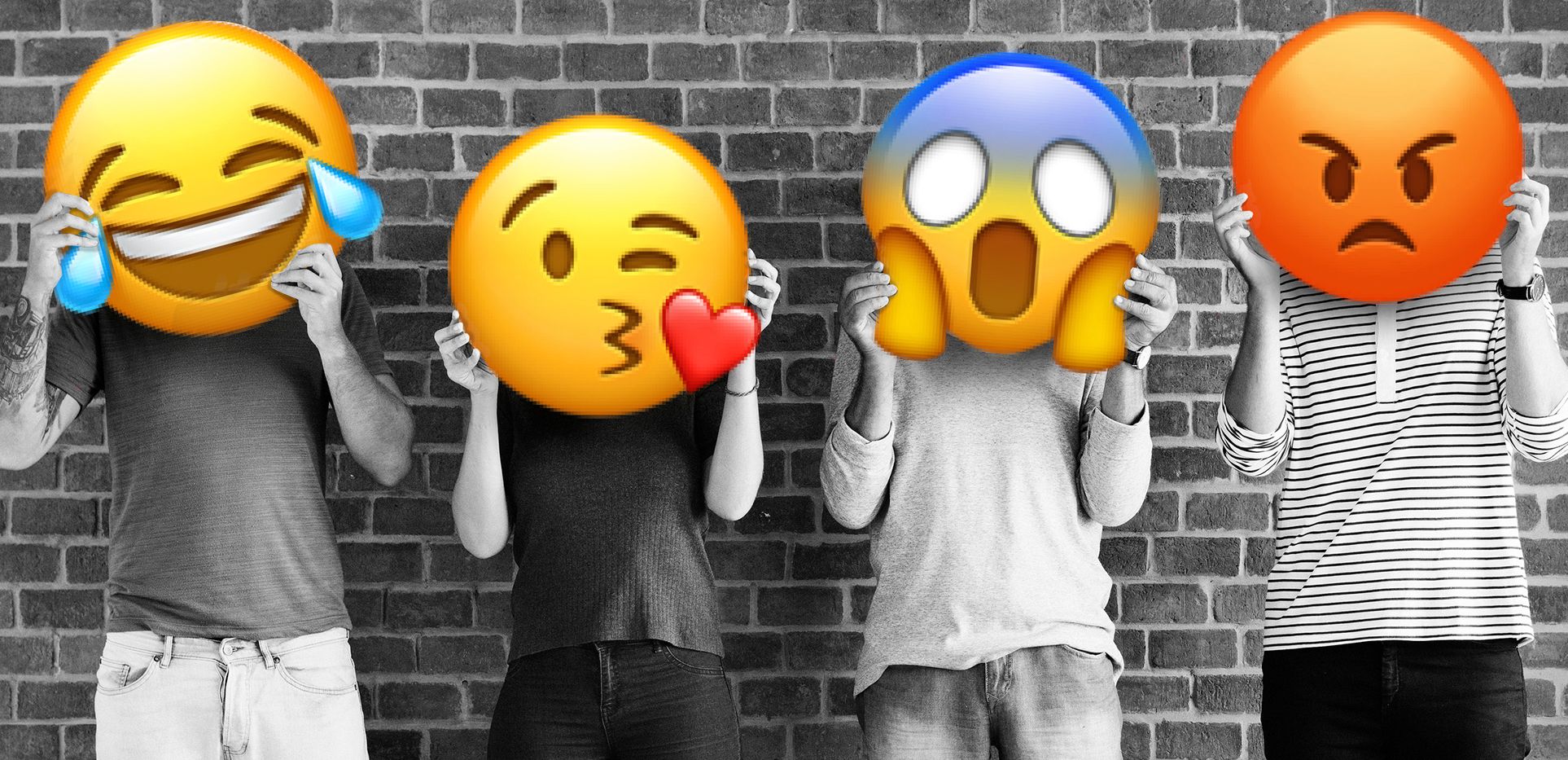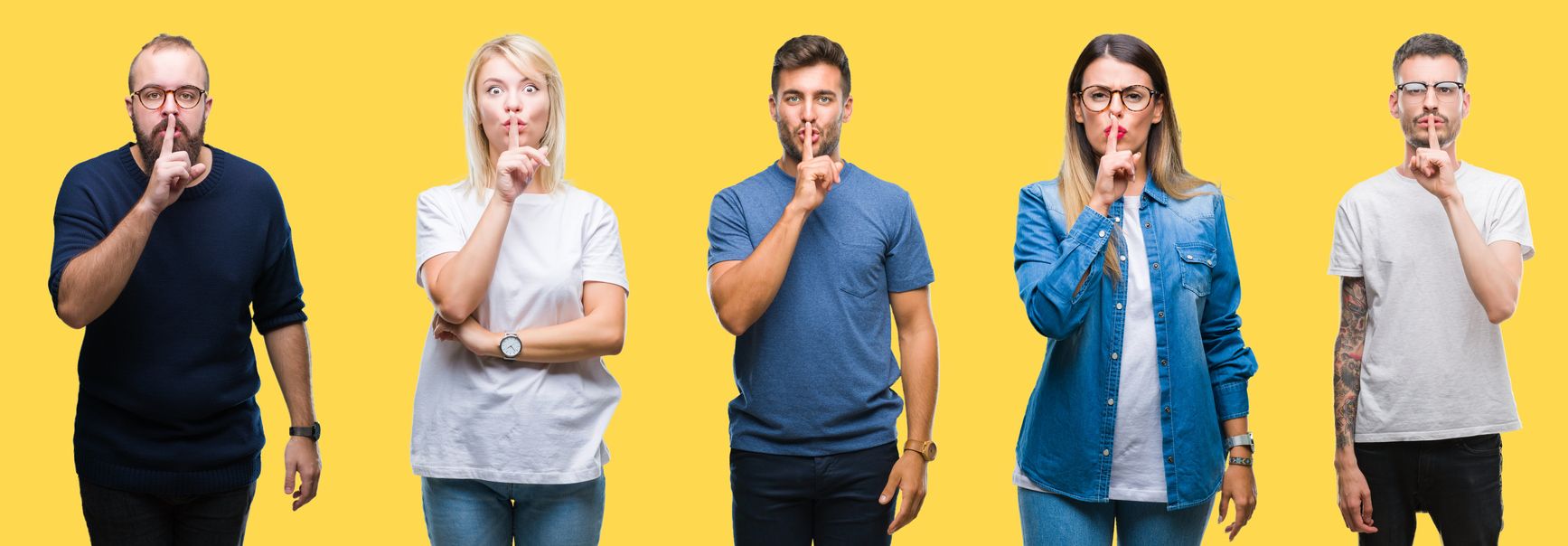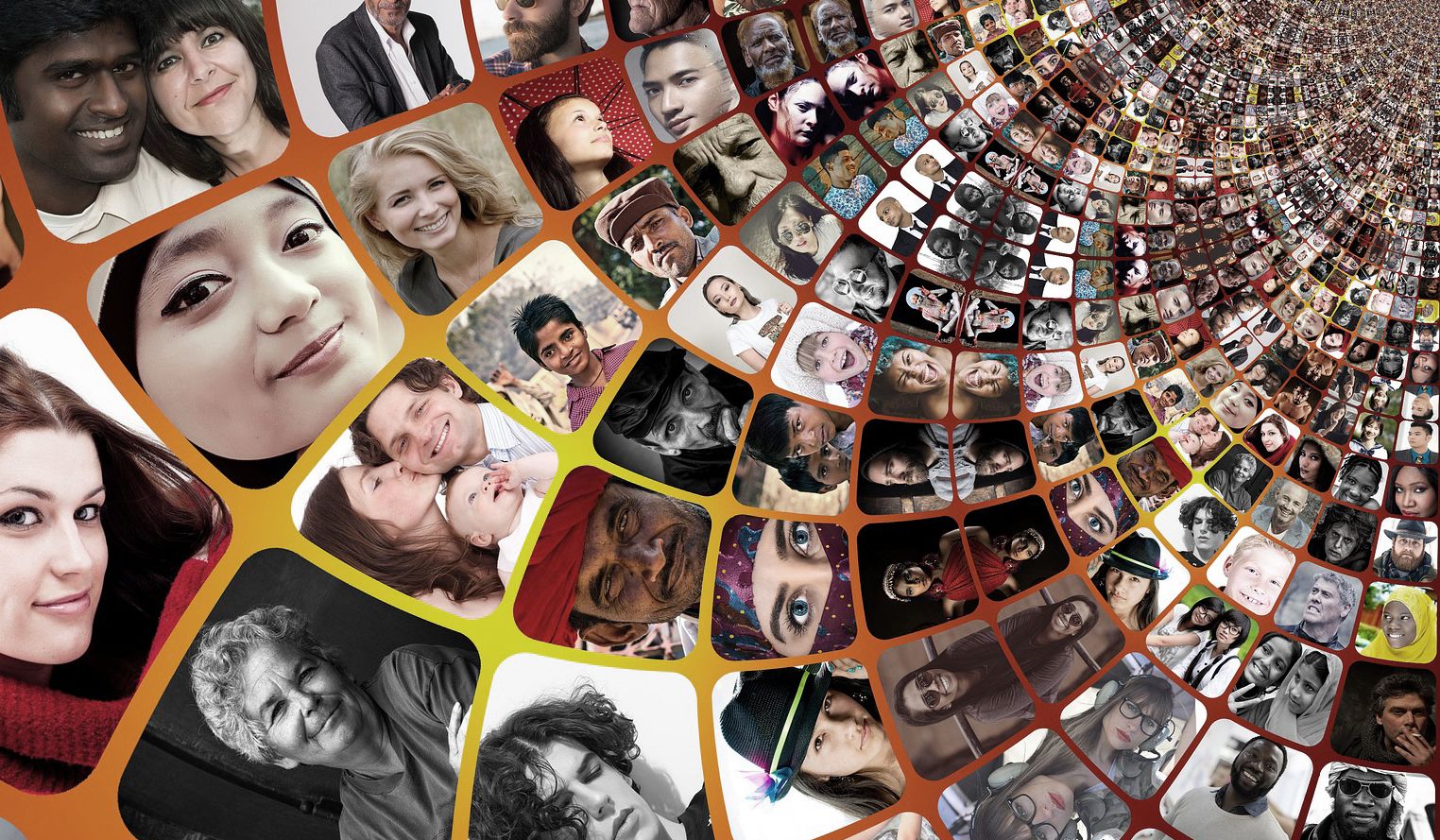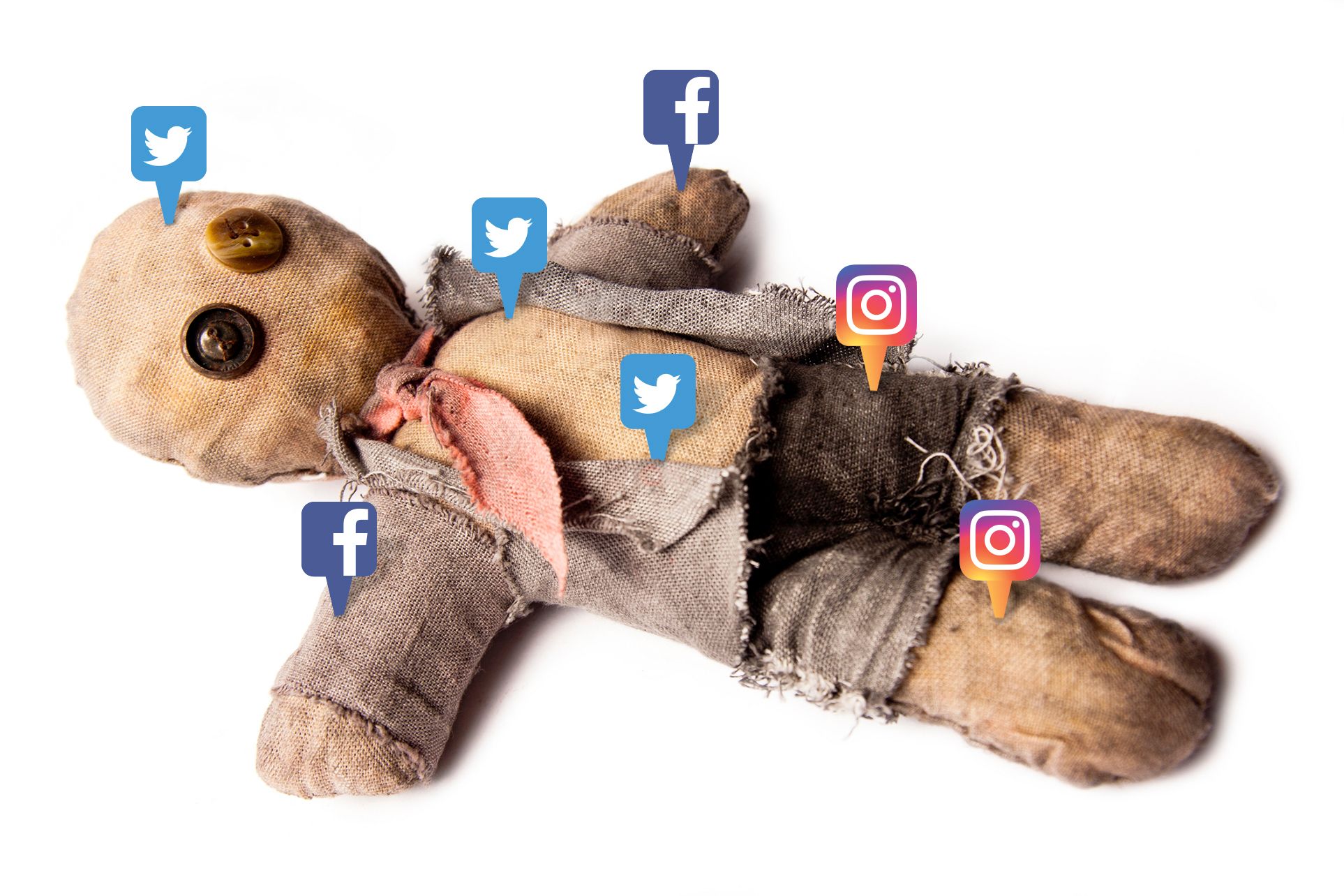Afraid to be ourselves – Part 1: Defining the problem
Our hyperconnected global social circle exceeds the capacity for humans to mentally process each other as individuals. What are the consequences?

“Your opinion matters.”
“Your vote counts.”
“Tell us what you think.”
Such phrases are as commonplace as they are hollow. The truth is, very few people want to hear our opinion unless it’s compatible with their own.
Our vote counts, but only because our ‘choice’ has already been made for us—our options narrowed to a select few, whether we’re voting for our nation’s leader, purchasing from an online retailer, or searching for information online. As for telling someone what we think, that’s now the best way to get ourselves pigeon-holed and lumped in with every other ‘bigot’ who doesn’t see the world exactly as our ‘conversation partner’ does.
But here’s the twist. We readily recognise when we’re on the receiving end, but rarely see when we’re doing the exact same thing to others: narrowing down the options we allow others for interacting with us.
Or if we are aware we’re doing so, we believe that we—unlike them—are 100% justified in censoring their own ‘toxic’ flow of consciousness.
Narrowing down our options for interaction
The consequence for society, with each of us predetermining how we’ll allow others to interact with us, is that the more people we encounter, the narrower our collective options become.
The reason for this is simple: we either carry in our heads a set of specific rules for lots of different people, or we generalise to keep things simple:
“People don’t like me talking about that”.
Hence the age-old adage: “Never discuss religion or politics in general company.” Perhaps that’s why British people talk about the weather when they meet.
Nothing left to talk about?
We are rapidly approaching the day when we’ll have nothing left to talk about “in general company”—unless it’s on some centralised pre-approved list. Some might argue we’re already there, especially given the appetite across so-called free societies for introducing legislation to govern what people are allowed to say to one another. We are systematically suffocating the spontaneity and creative potential from our interactions through self-censorship, reinforced with an ominous fear of being shamed on social media, reported to our employers, attracting the attention of the press, or worse.

When all our conversations are on display for the whole world to see, and everyone and anyone can search through our back catalogue of verbalised consciousness, all our communications become unrehearsed solo performances where our audience is a throng of hecklers and critics, motivated to catch us out. If there is anyone out there in the audience who actually agree with what we’re saying, we would never know. They’re all too afraid of the faceless digital mob piling abuse on us, grateful we’re taking the flack on their behalf—perhaps even eager for us to fall so they can claim as as a tragic martyr to whatever ideal or cause they hope to project onto us.
Let’s stop for a moment and consider what is happening here—and why. Doing so may help us to find a way forward.
Why interactions are narrowing
It’s obvious from history and our own personal experience that we can say some things to some people, but not to others. That’s nothing new. Words rarely come alone. They bring their family, friends and all their exes. Each word activates a multiplex of associations and memories in the minds of a listener, and these are accompanied by all the emotions such associations and memories produce.
Same words, different reaction
Telling one person their hair looks nice today can be just what they need to pick them up when their self-esteem needs a boost. But say that to another person, or in a different context, and those same words get interpreted as a criticism of their ‘normal’ hair. It may even be considered flirtatious, inappropriate, or sarcastic.
The reaction our words evoke depends not on the words themselves, but on the hidden inner life of the listener and how they perceive the relationship they have with the speaker.
There is often no reliable way to predict the idiosyncratic reaction our words might have on a specific listener, unless we know them well. But one bad reaction to our words from one person can often be enough to permanently relegate those words to our “Must not say” bin—not just for that person in that situation, but for every other person in every other context, just in case. The word itself becomes a self-censored taboo.
I’m a good person (I think)
This self-censorship should not surprise us. Most people think of themselves as being “a good person”, which means that most of us don’t want to go around upsetting others, especially if that was never our intention. So when our words trigger such an unexpected and intense reaction it mars how we see ourselves. Moreover, it threatens to sabotage how others perceive us—and we very much depend on the perception of others for building and maintaining relationships, creating reciprocity, and accessing resources we cannot attain by ourselves.
The time before the Internet
Imagine such a faux-pas happening in a world without the Internet and smartphones. We say something to an individual that ends up upsetting them. Maybe it was deliberate. Maybe it was unintentional. Chances are they would complain about us behind our backs to their friends, who would collectively speculate about what our motivations might have been (“I’m sure they didn’t mean it” versus “That scumbag! I never trusted them!”), fantasizing over what comeuppance we might deserve.
Such gossip might then result in our shared social circle acting ‘off’ around us. But, if we have the emotional intelligence to recognise this alteration in people’s interactions with us, or if someone within our group is a natural mediator, we’ll hopefully get the opportunity to patch things up. Worst case scenario, we burn all our bridges, move cities and start over… hopefully learning enough from the devastating experience not to make the same mistakes with any new social circle we become a part of.
Self-contained fall-out
In summary, before the Internet and smartphones, any fall out from our soured interactions were generally contained within a small social circle of inter-dependent individuals who had a vested interest in maintaining the status quo amongst themselves. If the fall-out proved too serious, then the damage to our relationships and social identity would generally be contained within that small, generally self-contained social circle. As long as we could successfully extricate ourselves from that group—i.e. the group where “everyone knows your name” as well as all the names of the skeletons in your closet—we would have a fighting chance of a fresh start somewhere else.
Not so today. Not now we all belong to The Great Global Social Circle.

Everyone, everywhere, all at once
Smartphones and the Internet result in instantaneous connectivity to everyone, everywhere, all at once. Our social circle is no longer confined to relatively small groups of individuals that likely have some vested interest in our mutual wellbeing or maintaining the group’s status quo. Now our social circle is the entire human race.
Any ‘misdeeds’—as categorised and caricatured by those we offend or fall out with—become part of an immense collective social memory that never goes away. We become as actors typecast in a particular role for the rest of our lives. It matters not that we could have spent the past decade demonstrating in words and deeds how we’ve turned over a new leaf. But a single regretful or out-of-context social media posting from ten years ago can be enough to tip the scales of ‘social justice’ against us.
No mercy. Only ‘social’ justice.
There is no forgiveness in the Great Global Social Circle. No opportunity for repentance. No redemption. Only condemnation and social humiliation. Unless you conform—and anticipate in advance how you’ll be expected to conform in the future.
Even if we patch things up with the offended individual online (or, more usually, the individual we offended on someone else’s behalf), the collective social memory of our transgression remains. The reason for this is obvious: there are just too many other people out there who still regard us as a dehumanised avatar of ill-repute. Perhaps they never got the memo to update their attitude towards us. But more likely, we have become remodelled into a symbol of everything they stand against.
To forgive us, would be to compromise their values. It would be like saying, well perhaps the devil is just misunderstood. Such empathy for the enemy is the quickest way for them to lose their own hard-earned status and credibility in the Great Global Social Circle. Forgiving you, or to concede that you may have a point, would be like a restaurant tolerating the presence of a single cockroach and expecting to keep their reputation for good food.
Without opportunity for forgiveness and redemption, what options are left to us?
We cannot simply extricate ourself from the Great Global Social Circle and start over somewhere new, because there is no other global social circle. The circle reaches everywhere, with eyes and ears in every pocket. Informants lurk in every room, actively seeking opportunity to raise their own status in the hierarchy of digital approval by bringing the mob another human sacrifice to tear apart and reconstruct as some repulsive effigy of evil.
Reborn as effigies of (another’s idea of) evil
This persistent connectivity and collective social memory means that wherever we go in the physical world, people will still know who we are. Or rather, they will know the ‘you’ that has been fashioned as the embodiment of a single transgression. Of course, you do not recognise this ‘you’. Though it shares your name and image, it is not you—though it certainly feels like you when they attack it. It is instead a caricature drawn by some faceless detractor who has cast you in their own morality play: you, an inhuman monster, incapable of emotion or remorse. For them, yours is not “a single transgression” as you believe it to be. For them, your words represents a symbol of everything that is ‘not them’. So they need you to be ‘evil’, a foil to their ‘good’.

Sacrificing our humanity to other people’s cause
Symbols are very powerful. They take complex ideas and distill them into a single representation. Consider the symbolism of burning a flag or sacred book, or displaying the head of an enemy on a pole. Symbols become rallying cries in a group’s fight against their own idea of ‘evil’, so there is social currency in being able to deliver to one’s own group a new symbol to epitomise what it is they are fighting against. Bringing your head or destroying your effigy online will boost their digital status and social standing no end. It announces to the rest of the group that they are truly devoted to the cause, and that’s not something they’ll want to give up easily.
So humanising you by getting to know the real you is out of the question. Doing so would reveal to them a complex, multi-dimensional human being with a whole range of nuanced opinions, some of which may even overlap with their own. Yes, getting to know you as a human being may lead to them realsing they have things in common… with you. But that won’t help with their symbolism or self-identity, will it?
Technology evolves. Human nature doesn’t.
The Internet has changed many things, but it hasn’t changed human nature.
We still need our Bubbles of Certainty.
We still need our tribes.
We still need to establish our place within our tribe.
We still need our ‘good’ and ‘evil’.
We still need our symbols.
What the Internet has changed is that it has connected us to everyone, everywhere, all at once. Any social circle this pervasive, this all-encompassing, this total generates far too much complexity for any human mind to accommodate. So what happens? We simplify. We distill those complex relationships, interactions, ideas and personalities into symbols, slogans and stereotypes that make sense to us without the need for too much mental processing. And because we try to make sense of the world by initially comparing things to what is ‘like us’ (our tribe = good) and what is ‘not like us’ (their tribe = obviously evil, because we are good), we cannot help but divide the world into binary categories (us/them; good/evil; right/wrong; with/against; pro-/anti-).
All of us glibly toss other human beings into one such category or another in accordance with our personal belief/value systems—even though all of us consider it an affront when others do the same to us. We are complex human beings, we protest. We are not just some label you think you can stick on us, we want to say. And we are certainly not the same as everyone else you keep trying to lump us in with.
Yet who is listening to our protestations?
Forgetting how to be ourselves
Isn’t everyone too busy clamouring for their own recognition as individual human beings—their own voices vainly competing against the billions of other ones that make up our Great Global Social Circle? Yes, we want to stand out from the crowd if it means that we count; that they’re not just surplus to requirements in a claustrophobically crowded social space. But no, we don’t want to stand out if it’s because we’re being publicly shamed.

So everyone walks a fine line in the Great Global Social Circle: recognition without being recognised. Give the crowd what it wants. That means conformity—moving mindlessly with the flow. Better still, it means pushing the agenda of crowd by exposing anyone who stands against it. That’s the way one gains recognition in the Great Global Social Circle without revealing the real ‘you’, with all your complicating complexity and nuanced concerns.
So each of us becomes afraid to be ourselves. Each of us reveals only what we believe will be compatible with the amorphous mob. We speak out only if we’re confident we have nothing new to, and that we’re moving in the same direction as the crowd.
But in doing so, we sacrifice the randomness, creativity and trust that always used to mark the interactions of complex human beings when they met face-to-face in the safety of small groups. Small groups who knew and trusted one another. Now, lost in a crowd of billions, we become as indistinguishable and predictable as the algorithms that narrow our choices assume us to be.
It’s no longer that we’re afraid to be ourselves…
It’s that we’re forgetting how to be.
Summary
- Human beings thrive in small social groups where everyone has a vested interest in maintaining the group’s status quo (e.g. reciprocity and access to resources). Because we all know each other, we can tailor our words and deeds to specific individuals so as not to deliberately offend them and maximise the future. In the worst case scenario—if we are unable to patch things up, for example—we can leave our current social circle and find another one (e.g. in another town).
- The introduction of smart phones in combination the Internet means that we are now connected to everyone, everywhere, all at once. This has created a Great Global Social Circle from which we cannot escape simply by changing cities. The Great Global Social Circle also has collective memory which remembers (and does not forgive) any transgression against the current drive of the crowd.
- The size of the Great Global Social Circle is too immense for us to interact with (and keep track of) on person-by-person basis, which makes it impossible to treat everyone specifically according to their unique qualities and life experience. To simplify this overwhelming complexity, we increasingly rely upon symbolism (such as labels and stereotypes) and by dividing the world up into those who are like us (or with us) and those who are unlike us (or against us).
- Because people consider themselves to be generally ‘good’, those who are unlike them ‘obviously’ must be not good, or ‘evil’ (or some other negative characteristic). There is no room for nuance in our interactions, because that would require getting to know the other (anonymous) person as a complex (and real) human being. It is easier to see them as a faceless representation of everything we stand against. We dehumanise others online who don’t see the world as we do, treating them instead as the embodiment of everything we (and our tribe) are against.
- On the flipside, we consider it an affront when we are dehumanised in this way by others, yet we recognise that the crowd is too large for us to persuade otherwise. It is therefore safer to remain in the background, rather than risk being used by the crowd in their latest ‘effigy-burning’. We may only ‘break cover’ when our values are at stake; when we, in turn, then narrow down the options for how others are allowed to interact with us, thus adding to the collective global “must not say” bucket.
- The consequence is that we have become afraid to be ourselves. More than this, we risk forgetting how to be ourselves. We are becoming more conformist, more predictable, and less spontaneous. This makes it easier for computer algorithms (or those with power over us) to make our choices for us, under the pretence that the decision is ours, which further adds to the loss of diversity in human consciousness.

